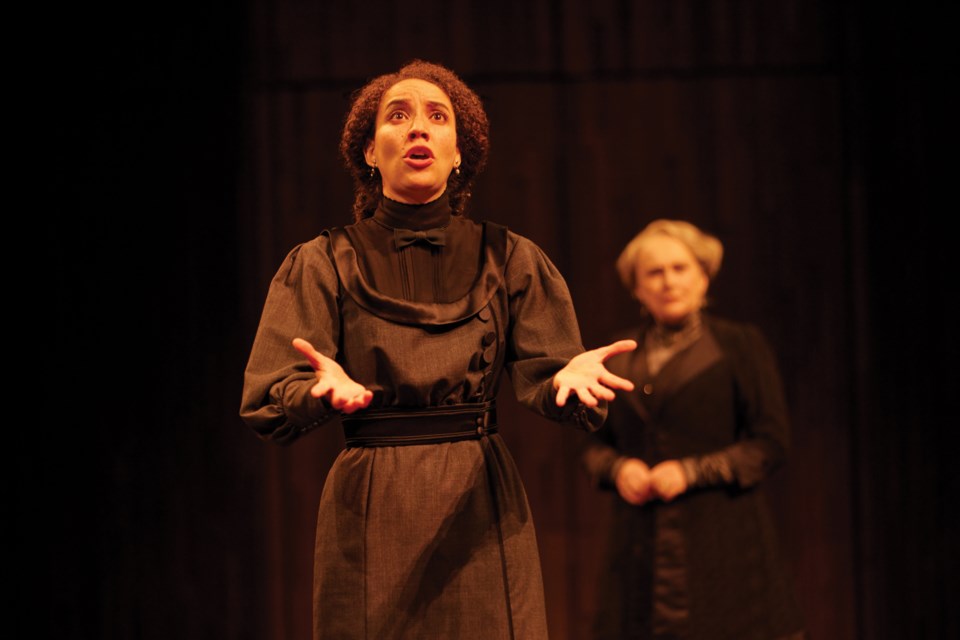With all its twists and turns from scenes of abject melancholy to the application of burlesque to take down a peg or two its heroes that are more devious and deceitful than your everyday villains, one might assume All’s Well That Ends Well is, as labelled, one of Shakespeare’s problem plays.
Well, there’s no problem with the riveting production currently playing at the Tom Patterson Theatre, showcased by a top-notch cast and an experienced director in Scott Wentworth, always in control and masterfully taking advantage of one of the Bard’s most literate but sadly seldom performed works.
That matter of it being a problem play – alongside Measure for Measure, The Merchant of Venice, Timon of Athens, Troilus and Cressida and The Winter’s Tale – there’s no question it shifts dramatically from psychological complexity and ambiguity to outright comedy quickly.
The text qualifies in the problem category simply because the plot is neither conventional nor are the expectations of the story’s major characters. However, that is one of the many reasons it is so much fun for audiences to sift through and sort out the various oddities and character flaws.
As for just who the protagonist is, it’s not difficult to come to grips with the fact it’s Bertram, the feckless class-conscious young Count of Rossillion. He’s a womanizer known for his good looks and likeability but in reality, little more than a cad with a penchant for seeking out virgins, having his way with them, then rapidly scurrying away with no accountability.
Jordin Hall is well cast and does a fine job in the role but one wonders whether he could have stretched the character even further. After all, he is the unscrupulous lout who, when told he must marry Helena, refuses sexual intimacy and vows he will never be her husband until she can remove a certain ring from his finger and provide proof that she is pregnant with his child.
He’s in the court of the seemingly deathly ill King of France, played initially with appropriate pessimism then with philosophical regality, by the always-reliable Ben Carlson. Along for the ride is Bertram’s pompous military companion Parolles, soon-to-be revealed on several fronts as beyond cowardly and treacherous. In the scene-stealing hands of Rylan Wilkie, the annoying braggart is a sight to behold who brings the play to absurdly glorious highs and lows.
Helena (Jessica B. Hill), the clever but socially uncomfortable daughter of a much-beloved deceased physician and ward of the Countess of Rossillion (Seana McKenna) plans to cure the King’s fistula with a formula developed by her late father. She does exactly that in short order, thereby securing the royal seal of approval for her miraculous treatment.
While it’s more than a tad difficult to fully grasp exactly why Helena, who summarily dismisses a quartet of suitors appointed by the King, loves Bertram while only acknowledging little more than he is handsome and popular among his circle of friends.
These were different times so her unusual medicinal skills and later a plot co-authored by the virginal Dianna (the marvellous Allison Edwards-Crewe) to have her way with the young count, instead of the other way around, certainly qualifies her as a protagonist. Hill is brilliant in her portrayal.
Meanwhile, McKenna, who demonstrates eloquently how wisdom and careful reflection has shaped her character over the years, waxes poetic on numerous occasions:
It is the show and seal of nature’s truth,
Where love’s strong passion is impressed in youth.
By our remembrances of days foregone,
Such were our faults, or then we thought them none.
Although your faithful scribe sees the pleasures of using those loathsome spoiler alerts to reveal plot intricacies like Parolles’ contrived kidnapping or Helena’s presumed death, a more audience-friendly approach is pointing to performances that enhance the Bard’s difficult and perplexing tale.
Alongside the Countess, Wayne Best’s loquacious lord of the court Lafew brings the proceedings to boisterous heights as he repeatedly ridicules and lambastes Parolles:
Fare you well, my lord, and believe this of me: there can be no kernel in this light nut. The soul of this man is his clothes. Trust him not in matter of heavy consequence.
Edward-Crewe’s Diana, daughter of the widowed hostess of an inn and Helena’s co-plotter, is intelligent, resourceful and self-assured:
Mine honour’s such a ring:
My chastity’s the jewel of our house,
Bequeathed down from many ancestors;
Which were the greatest obloquy i’ the world
In me to lose: thus your own proper wisdom
Brings in the champion Honour on my part,
Against your vain assault.
Whenever the sexton (court jester) Lavatch is called upon for a discourse André Sills with great physicality responds in his booming, authoritative voice:
That man should be at woman’s command, and yet no
hurt done! Though honesty be no puritan, yet it…
By my troth, I take my young lord to be a very
Melancholy man.
Is there another problem with All’s Well That Ends Well? Well, this five-star production only plays until October 29 at the Tom Patterson Theatre. A thoroughly satisfying evening of top-flight entertainment.



